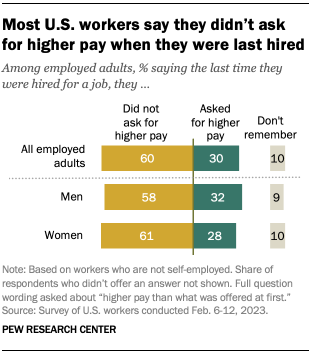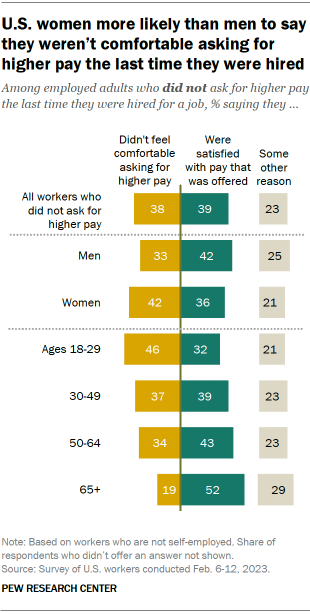The gender pay gap in the United States is sometimes linked to differences in the way women and men approach negotiating their pay. Most U.S. workers who are not self-employed say they did not ask for higher pay than what was initially offered the last time they were hired for a job, according to a new Pew Research Center survey. But men are slightly more likely than women (32% vs. 28%) to say they did ask for higher pay than what was offered.

Among workers who did ask for higher pay, 28% say they were given the pay they asked for, 38% say they were given more than was originally offered but less than they had asked for, and 35% say they were only given what was first offered. Women are more likely than men (38% vs. 31%) to say that after asking for higher pay, they were only given what had initially been offered.
Gender differences also emerge when workers who didn’t negotiate for more pay are asked why not. Overall, 39% of workers who didn’t ask for higher pay say they were satisfied with the pay that was offered. A similar share (38%) say they didn’t feel comfortable asking for higher pay, and 23% say there was some other reason.
Pew Research Center conducted this analysis to study how workers approach salary negotiations and whether there are differences by gender and other key demographic variables. To do this, we surveyed 5,775 U.S. adults, including 5,188 who are employed part time or full time, who are not self-employed, and who have only one job or have more than one but consider one of them to be their primary job. All the workers who took part are members of the Center’s American Trends Panel (ATP), an online survey panel that is recruited through national, random sampling of residential addresses.
Address-based sampling ensures that nearly all U.S. adults have a chance of selection. The survey is weighted to be representative of the U.S. adult population by gender, race, ethnicity, partisan affiliation, education and other categories. Read more about the ATP’s methodology.
Here are the questions used for this analysis, along with responses, and the survey’s methodology.

Men are more likely than women to say they were satisfied with the pay they were initially offered (42% vs. 36%), while women are more likely than men to say they didn’t feel comfortable asking for higher pay (42% vs. 33%).
There are also large differences by age. Younger workers who didn’t ask for more money during their last hiring are the most likely to say they didn’t feel comfortable asking for higher pay. Some 46% of those ages 18 to 29 say this, compared with 37% of those ages 30 to 49, 34% of those 50 to 64 and only 19% of those 65 and older.
Note: Here are the questions used for this analysis, along with responses, and the survey’s methodology.
